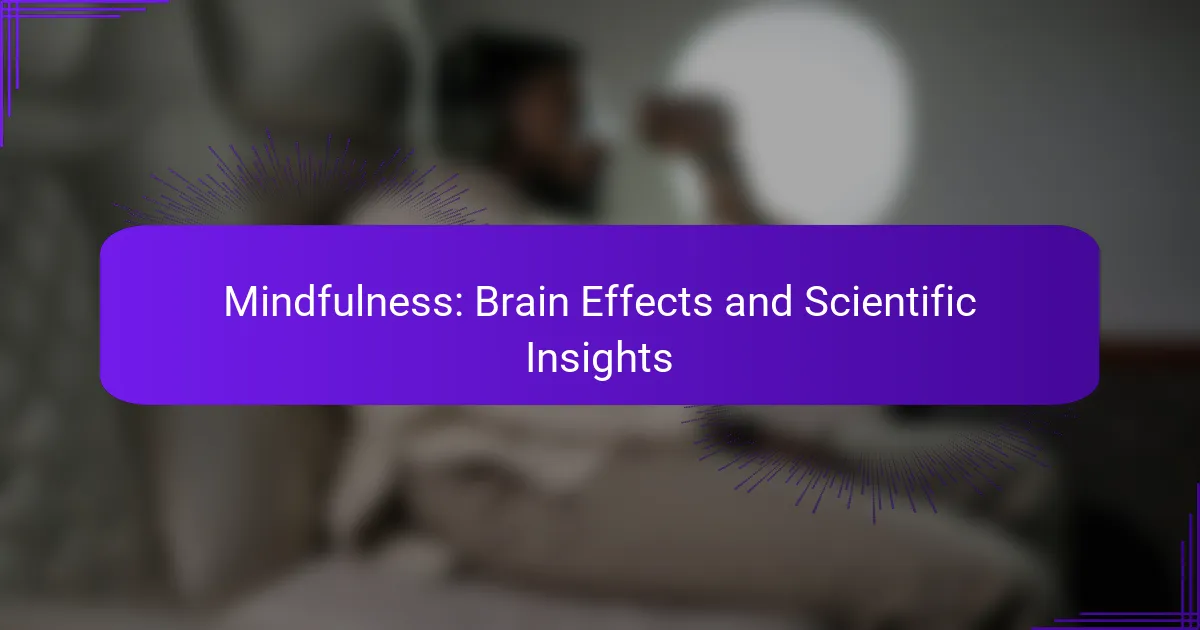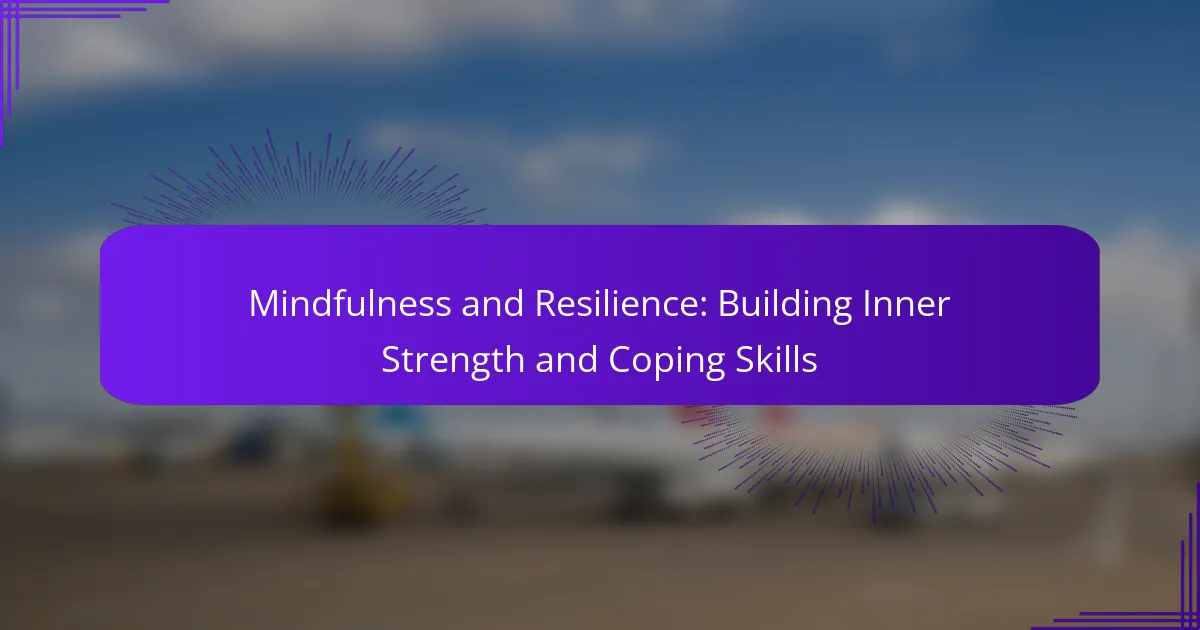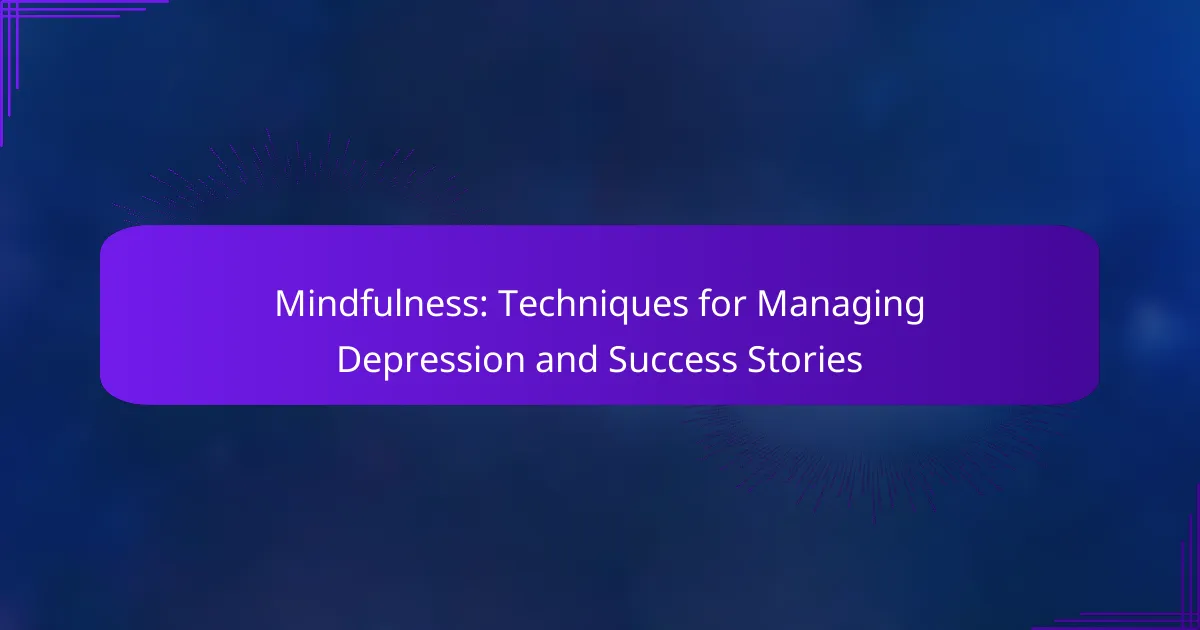Mindfulness-Based Stress Reduction (MBSR) is a structured program designed to help individuals manage stress by fostering awareness of the present moment through meditation, yoga, and group support. By practicing MBSR, participants can experience significant benefits, including reduced anxiety, improved emotional regulation, and enhanced overall well-being.
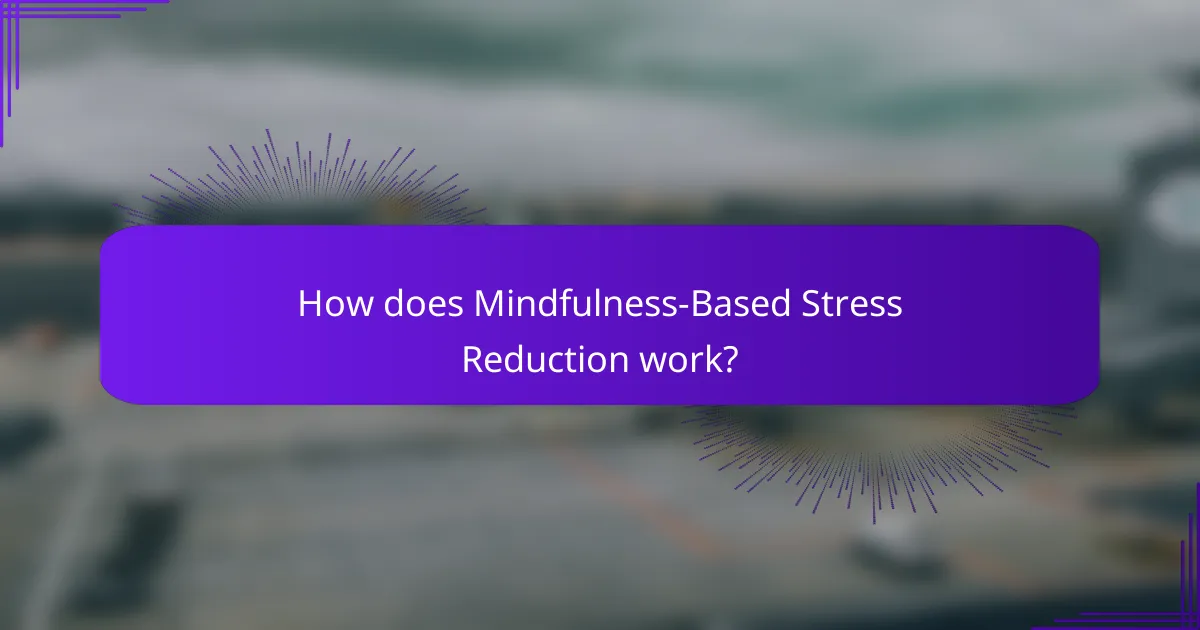
How does Mindfulness-Based Stress Reduction work?
Mindfulness-Based Stress Reduction (MBSR) works by cultivating awareness of the present moment, helping individuals manage stress through various techniques. It integrates meditation, yoga, and group support to enhance mental clarity and emotional resilience.
Focus on present moment awareness
Present moment awareness is a cornerstone of MBSR, encouraging participants to observe their thoughts and feelings without judgment. This practice helps reduce anxiety and fosters a sense of calm by shifting focus away from past regrets or future worries.
By regularly practicing mindfulness, individuals can develop a greater understanding of their emotional triggers and responses, leading to improved stress management. Simple exercises, such as mindful breathing or body scans, can be easily incorporated into daily routines.
Incorporation of meditation techniques
MBSR utilizes various meditation techniques to enhance mindfulness and promote relaxation. Common methods include guided meditations, loving-kindness meditation, and mindful walking, each designed to help participants connect with their inner experiences.
These techniques encourage individuals to cultivate a non-reactive awareness, which can significantly reduce stress levels. Practicing meditation for even a few minutes each day can yield noticeable benefits over time.
Structured group sessions
Structured group sessions are a vital component of MBSR, providing a supportive environment for participants to share experiences and challenges. These sessions typically last several weeks and include discussions, guided practices, and homework assignments.
Group dynamics foster accountability and motivation, making it easier for individuals to commit to their mindfulness practice. Participants often report feeling a sense of community, which can enhance the overall effectiveness of the program.
Integration of yoga practices
Yoga practices in MBSR focus on gentle movements and postures that promote physical awareness and relaxation. These sessions are designed to complement meditation by encouraging participants to connect with their bodies and release tension.
Incorporating yoga into the MBSR framework helps improve flexibility, balance, and overall well-being. Even simple stretches can be beneficial, making yoga accessible for individuals of all fitness levels.
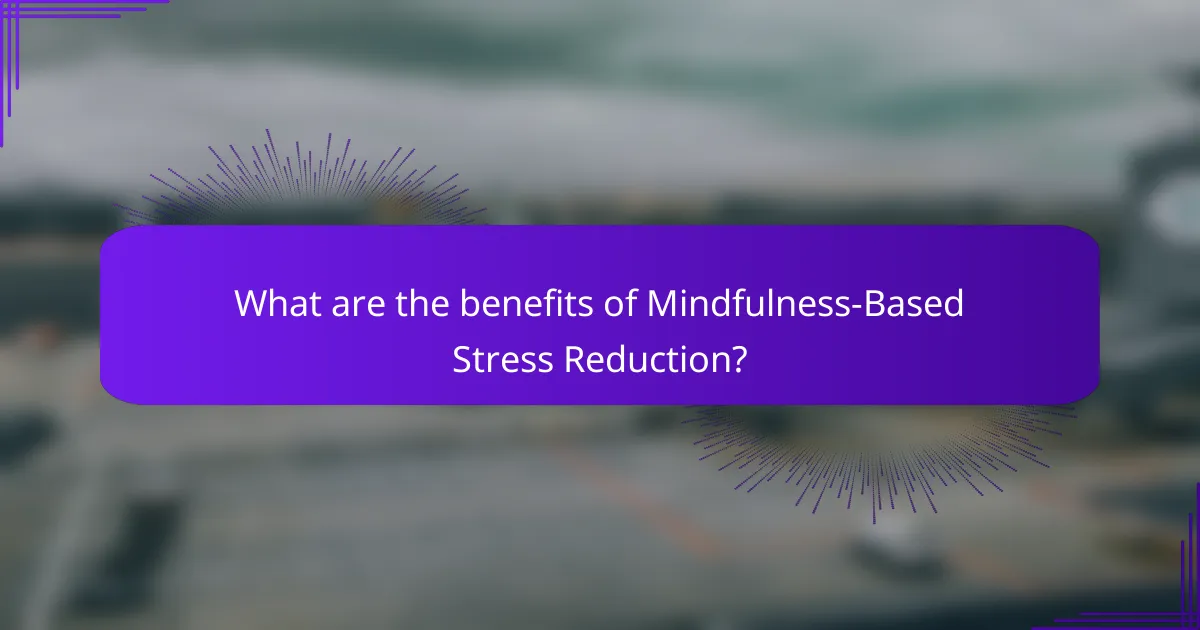
What are the benefits of Mindfulness-Based Stress Reduction?
Mindfulness-Based Stress Reduction (MBSR) offers various benefits, primarily focusing on reducing stress and enhancing emotional health. Participants often experience lower anxiety levels, improved emotional regulation, and a greater sense of overall well-being.
Reduction of stress and anxiety
MBSR is designed to help individuals manage stress and anxiety through mindfulness practices such as meditation and body awareness. By focusing on the present moment, participants can break the cycle of negative thoughts that often contribute to stress.
Research indicates that regular practice can lead to significant reductions in perceived stress levels, often within a few weeks. Techniques such as deep breathing and guided imagery are commonly used to help individuals cope with daily stressors.
Improvement in emotional regulation
Mindfulness practices foster greater emotional awareness, allowing individuals to recognize and respond to their emotions more effectively. This improved emotional regulation can lead to healthier responses to challenging situations, reducing impulsivity and enhancing decision-making.
Practicing mindfulness can help individuals develop a more balanced emotional state, which is crucial for maintaining relationships and overall mental health. Techniques such as journaling and self-reflection are often integrated into MBSR programs to support this growth.
Enhanced overall well-being
MBSR contributes to enhanced overall well-being by promoting a holistic approach to health. Participants often report improvements in sleep quality, physical health, and life satisfaction as they incorporate mindfulness into their daily routines.
Engaging in mindfulness can lead to a more positive outlook on life, fostering resilience against life’s challenges. Simple practices, such as mindful walking or eating, can be easily integrated into daily life to support ongoing well-being.
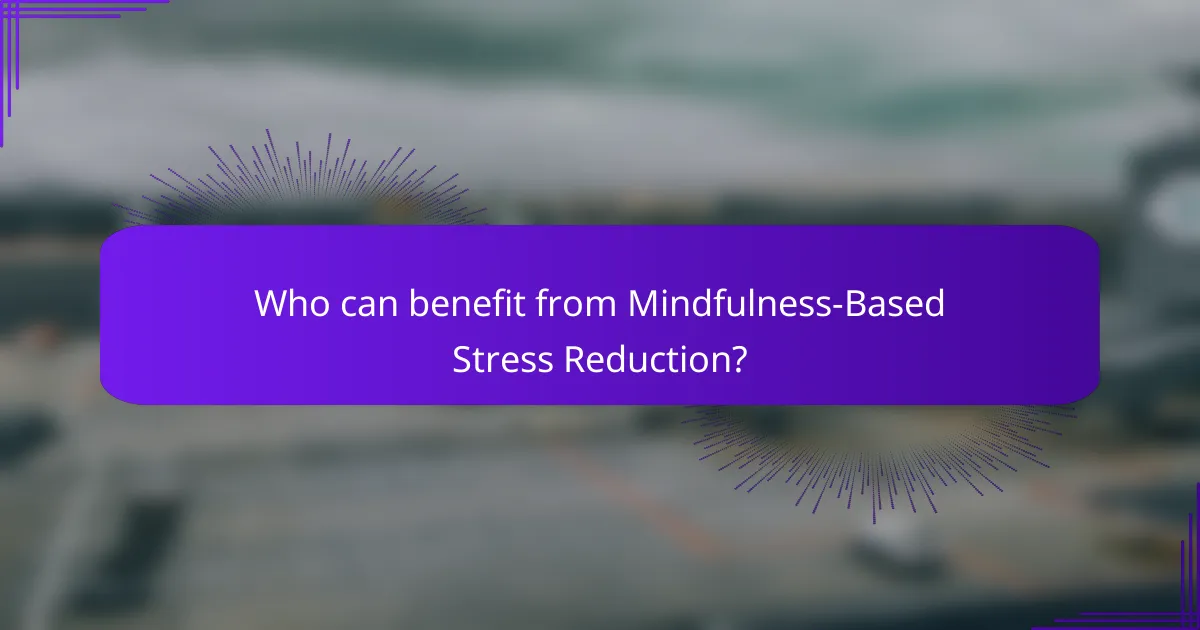
Who can benefit from Mindfulness-Based Stress Reduction?
Mindfulness-Based Stress Reduction (MBSR) can benefit a wide range of individuals, particularly those dealing with chronic pain, high stress levels, or seeking personal growth. This program teaches mindfulness techniques that help manage stress and improve overall well-being.
Individuals with chronic pain
People suffering from chronic pain often find relief through MBSR. The program encourages participants to focus on their bodily sensations without judgment, which can help reduce the perception of pain. Techniques such as body scanning and mindful movement can enhance awareness and promote relaxation.
Research indicates that MBSR can lead to significant reductions in pain levels and improvements in quality of life for those with conditions like arthritis, fibromyalgia, or back pain. Regular practice can empower individuals to cope better with their pain and improve their emotional responses to it.
People experiencing high stress levels
MBSR is particularly effective for individuals facing high stress, whether from work, personal relationships, or life transitions. The program teaches participants to recognize stress triggers and develop healthier responses through mindfulness practices. This can lead to improved emotional regulation and resilience.
Incorporating mindfulness techniques into daily routines can help lower stress levels significantly. Simple practices like mindful breathing or short meditation sessions can be done anywhere, making it easier to manage stress in real-time.
Those seeking personal development
Individuals interested in personal development can greatly benefit from MBSR by enhancing self-awareness and emotional intelligence. The program encourages reflection and introspection, allowing participants to understand their thoughts and feelings better. This self-discovery can lead to personal growth and improved relationships.
Practicing mindfulness can also foster a greater sense of purpose and clarity in life goals. Engaging in MBSR can help individuals cultivate patience, compassion, and a more profound connection to themselves and others, which are essential components of personal development.
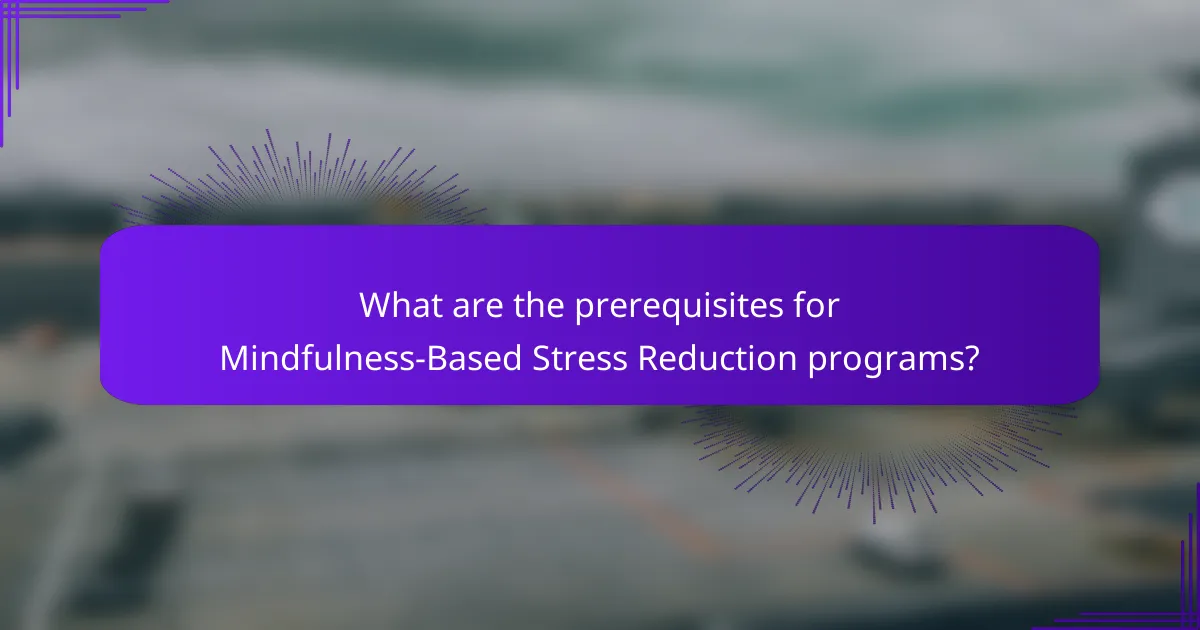
What are the prerequisites for Mindfulness-Based Stress Reduction programs?
To participate in Mindfulness-Based Stress Reduction (MBSR) programs, individuals should be prepared for a commitment to regular practice and an openness to group learning. These prerequisites help ensure that participants gain the most from their experience and can effectively integrate mindfulness into their daily lives.
Commitment to regular practice
A strong commitment to regular practice is essential for success in MBSR. Participants are typically expected to engage in mindfulness exercises for at least 30 minutes daily, which may include meditation, body scans, and mindful movement. This consistent practice helps deepen the understanding of mindfulness and enhances its benefits.
To maintain this commitment, consider setting specific times each day for practice and creating a conducive environment. Utilizing apps or guided recordings can also support consistency and provide structure to your sessions.
Openness to group learning
Openness to group learning is another key prerequisite for MBSR. The program often involves group discussions and shared experiences, which can enrich the learning process. Participants benefit from hearing different perspectives and insights, fostering a supportive community that enhances individual growth.
To embrace this aspect, approach group sessions with curiosity and a willingness to share your thoughts and feelings. Engaging actively with fellow participants can lead to deeper connections and a more rewarding experience overall.
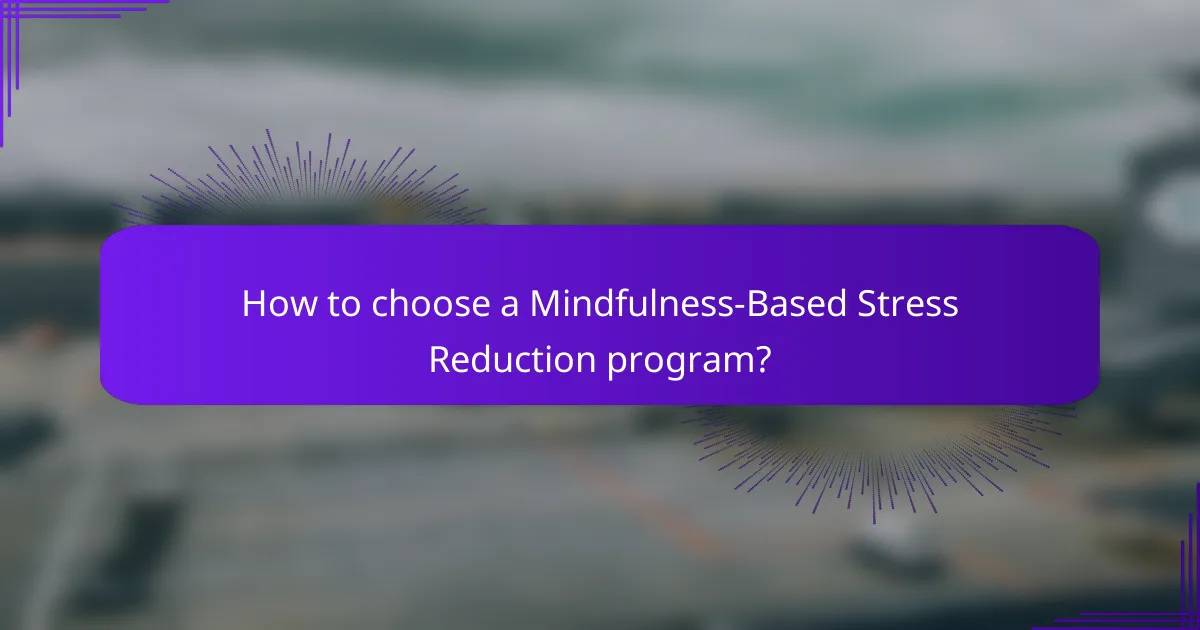
How to choose a Mindfulness-Based Stress Reduction program?
Choosing a Mindfulness-Based Stress Reduction (MBSR) program involves assessing various factors to ensure it meets your needs. Look for accredited programs with qualified instructors to maximize the benefits of your practice.
Consider program accreditation
Accreditation ensures that the MBSR program adheres to recognized standards, which can enhance the quality of your experience. Look for programs accredited by reputable organizations, such as the Center for Mindfulness in Medicine, Health Care, and Society.
Accredited programs often follow a structured curriculum and provide evidence-based practices. This can lead to more effective stress reduction and a deeper understanding of mindfulness techniques.
Evaluate instructor qualifications
The qualifications of the instructor can significantly impact your learning experience in an MBSR program. Seek instructors who have completed formal training in MBSR and have experience leading mindfulness courses.
Instructors should ideally have a background in psychology or health care, as this knowledge can enhance their teaching. Consider checking their credentials, such as certifications from recognized mindfulness organizations, to ensure they are well-equipped to guide you.

